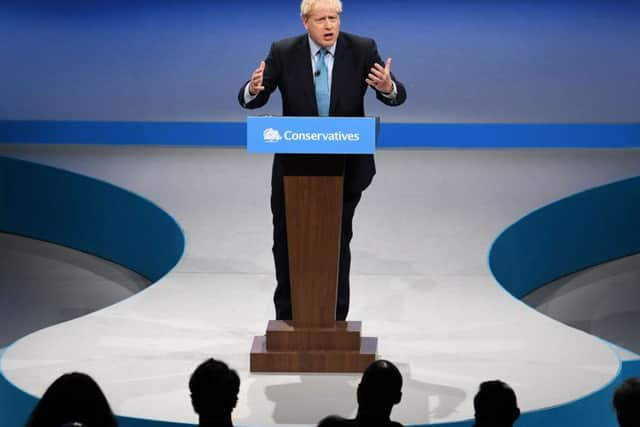EU gives Boris Johnson’s ‘problematic’ Irish border plan a cool reception
Resistance from the final 28 Brexiteer “Spartans” who rejected Theresa May’s Brexit deal three times appeared to be crumbling last night, leaving Mr Johnson just a handful of votes short of a majority.
In a letter to EU Commission President Jean-Claude Juncker, the Prime Minister said he was offering a “fair and reasonable compromise” and said his plan to replace the controversial backstop represented a “broad landing zone, in which I believe a deal can begin to take shape”. In a statement, the EU Commission welcomed what it called “positive advances”, but said “problematic points” remain.
Advertisement
Hide AdAdvertisement
Hide Ad“The delicate balance struck by the Good Friday agreement must be preserved,” the statement said.


The Prime Minister spoke by phone last night with Mr Juncker and Mr Varadkar, as well as German Chancellor Angela Merkel.
EU governments will consider the plans ahead of a crucial Brussels summit that begins on 17 October, where an agreement must be rubber stamped to avoid the possibility of a no-deal scenario at the end of the month.
Under the proposals, Northern Ireland would effectively remain under both UK and EU trade rules at least four years, with customs checks on goods crossing the border with the Republic of Ireland, and regulatory controls for those arriving from Britain.
The regime enters into force at the end of the post-Brexit transition period, at the start of 2021, but would first need to be approved by the Northern Irish Assembly, which would also decide whether to renew the arrangements every four years.
An explanatory note published alongside the proposals states that “if consent is withheld, the arrangements will not enter into force or will lapse”.
The Stormont Assembly has not sat since devolved power sharing between the DUP and Sinn Fein collapsed in 2017, but the potential for Northern Irish parties to veto the measures will be a source of concern in Dublin and Brussels.
That was highlighted in the EU statement, which said Mr Juncker “noted that there are still some problematic points that will need further work in the coming days, notably with regards to the governance of the backstop”.
Advertisement
Hide AdAdvertisement
Hide AdSinn Fein and the other main Northern Irish parties rejected Mr Johnson’s compromise. But despite appearing to breach the DUP’s previous red line on a barrier to trade between Northern Ireland and Great Britain, the party gave the plan its support.
“We believe this is a serious and sensible way forward to have engagement with the European Union in a way that allows us all in the United Kingdom to leave the European Union and therefore we will be supporting this plan,” DUP leader Arlene Foster said.
And the chairman of the European Research Group of Tory Brexiteers, Steve Baker, signalled his approval with a tweet at the close of his party’s conference in Manchester that Mr Johnson was a “hero”.
Opposition parties rejected the government’s proposals for the Irish border, with First Minister Nicola Sturgeon tweeting that it was “hard to escape [the] conclusion that they’re designed to fail”. And Labour leader Jeremy Corbyn said the plan would “undermine the Good Friday agreement”.
“It’s worse than Theresa May’s deal,” he said. “I can’t see it getting the support that he thinks it will get.”
But two Labour MPs representing constituencies in Leave-voting Stoke - Ruth Smeeth and Gareth Snell - indicated they would back a Brexit deal based on the plans.
Last night the EU chief Brexit negotiator Michel Barnier told journalists: “There is progress. But to be frank, a lot of work still needs to be done to reach, to fulfil, the three objectives of the backstop – no border, all-Ireland economy, and protecting the single market.
“The no-deal will never be the choice of the EU. Never. So we will continue to reach a deal and to work with the UK team.”